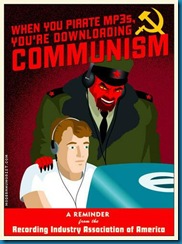In the midst of our ongoing debates over file-sharing and the latest twisted headlines from the RIAA, the discourse seems to have slipped into whether artists need to be compensated for their work (which they should) and whether the poor suicidal copyright watchdogs have gone over the deep end in attacking their own consumers (which they have). Yet it is important to remember that this is more than just an economic debate – this is part of an ongoing struggle to determine the appropriate line between comodification and our cultural evolution.
 Let’s face it – to varying degrees, we all enjoy what Hollywood spews out no matter how trite and repetitive it can be. Such endeavours require a substantial amount of capital and investors should be able to profit from their work if we expect them to continue being produced. Much as in the publishing and music industries, copyright law has existed for the purpose of safeguarding this monetisation. Yet it is important to remember that copyright is meant to be of a finite duration. This allows artists to profit from their work while also ensuring that future generations are able to continue building on this work when it enters the public domain. As James Boyle of The Public Domain notes:
Let’s face it – to varying degrees, we all enjoy what Hollywood spews out no matter how trite and repetitive it can be. Such endeavours require a substantial amount of capital and investors should be able to profit from their work if we expect them to continue being produced. Much as in the publishing and music industries, copyright law has existed for the purpose of safeguarding this monetisation. Yet it is important to remember that copyright is meant to be of a finite duration. This allows artists to profit from their work while also ensuring that future generations are able to continue building on this work when it enters the public domain. As James Boyle of The Public Domain notes:
Our markets, our democracy, our science, our traditions of free speech, and our art all depend more heavily on a Public Domain of freely available material than they do on the informational material that is covered by property rights. The Public Domain is not some gummy residue left behind when all the good stuff has been covered by property law. The Public Domain is the place we quarry the building blocks of our culture. It is, in fact, the majority of our culture.
Perpetual copyright effectively consolidates our cultural heritage into the hands of a few wealthy industrialists and restricts creative expression worldwide. This trend must be stopped.
You can read the full Manifesto here and please take the time to sign it.